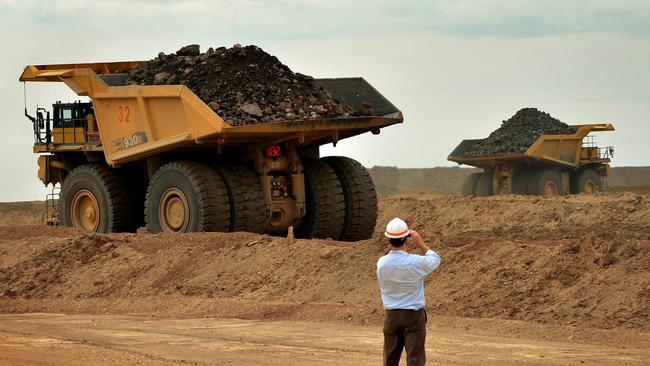Rio Tinto faces $500m tax bill in Singapore hub row
The miner may face a hefty additional tax bill following the ATO’s crackdown on the practice of transfer pricing.

Rio Tinto is facing a hefty additional $500 million tax bill following the Australian Taxation Office’s crackdown on the use of Singapore trading hubs.
Notes to the accounts released late on Wednesday said the company had made a $US380m ($500m) provision on its balance sheet over a tax dispute with the ATO.
A spokesman for Rio Tinto this morning clarified that the provision represented the full amount of the expected settlement.
Rio chief executive Jean-Sebastien Jacques told The Australian that the company had booked the provision after gaining greater clarity on the outcome of the dispute.
“We had some conversations with the ATO,” Mr Jacques said.
“There is nothing new in the discussions that are underway but we reached a point where we had more visibility on what provision could be and therefore we banked the provisions.”
Rio’s accounts confirmed that the dispute related to transfer pricing, where commodities produced by Rio are traded between its various subsidiaries across different tax jurisdictions.
Both Rio and fellow miner BHP Billiton have come under fire for their use of Singapore-based trading hubs as part of their iron ore sales process.
Rio Tinto’s Singapore subsidiary charges Rio Tinto’s Australian business a fee for its role in finding buyers for the ore, arranging transport and providing accounting services. The ATO has disputed whether that fee should lower Rio’s Australian tax liabilities.
The dual-listed structure of BHP, meanwhile, has allowed the company to pay a lower rate of tax through the use of its Singapore subsidiaries, due to a tax treaty between Singapore and Britain.
The dispute with the ATO relates to trade between Rio’s Australian arm and its Singapore centre since 2009.
Mr Jacques said the amount in dispute was minor in the context of its total tax payments over that time.
“Through the period from 2009 we have paid $37bn of taxes and royalties, so what you can see is pretty marginal,” he said.
BHP last September confirmed it was in a $1bn dispute with the ATO over its Singapore trading business, the bulk of which related to the period between 2009 and 2013, with BHP noting at the time that it did not agree with the ATO’s position.
The fresh detail around Rio’s tax dispute is likely to provide further ammunition for critics including West Australian Nationals MP Brendon Grylls.
Mr Grylls is calling for the introduction of a $5-a-tonne tax on iron ore produced by Rio and BHP, and has used the controversy around the trading hubs to build the case for his new impost.
Rio on Wednesday said its Pilbara iron ore operations generated an EBITDA margin of 63 per cent during 2016, but Mr Jacques said he did not believe the strong profitability of the unit would hurt its arguments against the tax.
“It’s not about Rio Tinto or BHP protecting their margins, it’s about the long-term competitiveness of the Pilbara in the context of a global marketplace,” he said.
“If this tax is imposed on us and BHP and at some point in time all the other miners, you would end up in the situation where the Pilbara would be the highest-taxed region globally.”



